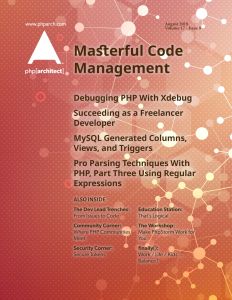Debugging in PHP can be tedious and prone to errors when using var_dump and echo statements. Xdebug is a powerful tool that can be used for debugging PHP more effectively and for gaining better insights into what an application is actually doing. In this article we will cover setting up an PhpStorm with Xdebug, how to use various browsers to enable debugging that will let you step into code and see variable values live, and how to extend those debugging capabilities into the command line interface (CLI), REST APIs, and SOAP clients.
Starting out as a freelance developer may seem daunting and the common misconception is that it’s a very unstable path. While there are ups and downs, their are no job guarantees today with any employer. In this article, see what you can do to succeed as a freelancer to find clients and work successfully to solve their problems.
Databases often have neat features that go unnoticed or lightly used that could make your life as a developer much easier. This article started its path to print at the php[tek] 2018 conference with a discussion on generated columns in MySQL. Several attendees seemed to need extra guidance and this article is an attempt to document how to use some underutilized features. These features do some of the work you would normally do in your application at the database layer which could save you a great deal of time, effort, and potential mistakes.
This article is dedicated to regular expressions. Regular expressions, or sometimes simply called regex, represent a powerful set of tools which allow developers to split strings, perform character substitutions, and extract text based on matched patterns. The patterns, used in regular expressions, are an actual language that describe combinations of type castings and values that match the text you want to split, substitute, or extract. Regular expressions are an enormously powerful tool for the developer who understands them.
Everyone on your team should have a good idea of the actual problem or feature they are working on before any code is written. Once the issue itself is ready to go, the work can begin. Every company will be slightly different in how they want to handle actual commits, but this month I will detail the most common workflows I use with teams to manage changes to a codebase.
This month we’re going to dive into PhpStorm and cover configuration from personal preferences to obeying standards and day to day usage. We’ll see how to use the features of an IDE to improve your productivity and the quality of your code.
Any application aimed at presenting users with a premium, seamless UX must take account of the times when user authentication fails. What happens when a user forgets their password? What can we do to confirm sensitive operations using email or other out-of-band communication? How can we make an application easy to use while also keeping it secure? One mechanism, which protects both password reset links and other secure actions taken by way of an out-of-band confirmation is that of secure tokens.
The PHP community makes a big deal about user groups, and for a good reason. Meeting up with local peers and creating a network of people can be beneficial. Many user groups will have a talk most months which makes a nice talking point and a good opportunity to learn something new. The many PHP conferences, too, prove their worth time and time again. Different ticket price ranges, different types of conferences, unconferences, camps, and conventions exist. Again, many have talks and tutorials which are the perfect opportunity to broaden your skill set. And, like user groups, you can expand the reaches of your professional network. What about when you are too far from these? Or can’t afford to attend a conference?
This month we practice working “close to the hardware.” We’ll see why this is becoming more important to today’s software developers. We’ll use the PHP bitwise operators to manipulate single-bit binary numbers. We’ll then take a more general look at ways to learn what we need to learn.
I work from home and making sure that there is a proper work/life balance is essential for mental and physical health. However, with the prevalence of remote work, it’s not as easy to separate the two. We gain the benefit of not needing to commute. We obtain the ability to have extremely flexible hours. However, it can be all too easy to slip back into work.





Leave a comment
Use the form below to leave a comment: